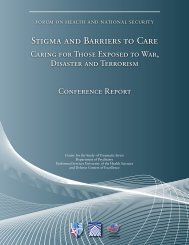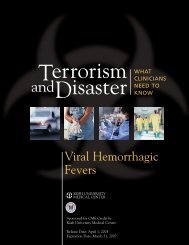An Interview With Bruce D. Perry, MD, PhD - Center for the Study of ...
An Interview With Bruce D. Perry, MD, PhD - Center for the Study of ...
An Interview With Bruce D. Perry, MD, PhD - Center for the Study of ...
Create successful ePaper yourself
Turn your PDF publications into a flip-book with our unique Google optimized e-Paper software.
The development<br />
<strong>of</strong> <strong>the</strong> brain is “usedependent”<br />
meaning<br />
that brains develop<br />
according to <strong>the</strong><br />
stimuli <strong>the</strong>y encounter.<br />
Because each child’s<br />
experience is different,<br />
each brain adapts<br />
uniquely.<br />
The Effects <strong>of</strong> Violence on <strong>the</strong> Brain <strong>of</strong> <strong>the</strong><br />
Developing Child<br />
By James E. McCarroll, <strong>PhD</strong><br />
Dr. <strong>Perry</strong> presented <strong>the</strong> inaugural lecture<br />
in <strong>the</strong> McCain Lecture Series (www.lfcc.on.ca)<br />
in London, Ontario, Canada, on his work on<br />
<strong>the</strong> effects <strong>of</strong> family violence on children. The<br />
lecture describes optimal as well as disrupted<br />
child brain development, and provides practical<br />
advice on strategies to shape optimal development<br />
<strong>for</strong> children.<br />
Dr. <strong>Perry</strong> explains that early life experience<br />
determines how a child’s genetic potential is<br />
expressed. The development <strong>of</strong> <strong>the</strong> brain is<br />
“use-dependent” meaning that brains develop<br />
according to <strong>the</strong> stimuli <strong>the</strong>y encounter. Because<br />
each child’s experience is different, each<br />
brain adapts uniquely. Optimal development<br />
is achieved when <strong>the</strong> child experiences consistent,<br />
predictable, enriched, and stimulating<br />
interaction in attentive and nurturing relationships.<br />
Brain development is also susceptible<br />
to negative influences. Children who do not<br />
have a stable and nurturing environment are<br />
subject to damage to <strong>the</strong>ir developing brain.<br />
Prolonged, chronic stress leads to maladaptive<br />
neural systems, which may be adaptive <strong>for</strong> <strong>the</strong><br />
child’s survival in <strong>the</strong> short term, but problematic<br />
<strong>for</strong> later intellectual, emotional, and social<br />
development.<br />
Dr. <strong>Perry</strong>’s lecture addresses points <strong>for</strong><br />
parents, service providers, and community<br />
leaders to foster improved child and family<br />
development and functioning. He emphasizes<br />
key scientific principles paired with practical<br />
suggestions that can be implemented widely in<br />
public education programs:<br />
■ ■<br />
Promote education about brain development.<br />
While FAP personnel are not neuroscientists,<br />
<strong>the</strong>y can help educate <strong>the</strong> public about key<br />
principles <strong>of</strong> brain development to help parents<br />
understand <strong>the</strong> long-term importance<br />
and implications <strong>of</strong> <strong>the</strong>ir actions.<br />
■ ■ Respect <strong>the</strong> gifts <strong>of</strong> early childhood. High<br />
quality early childhood care settings should<br />
provide enriching, safe, predictable, and<br />
nurturing environments. During early childhood,<br />
<strong>the</strong> brain is developing most rapidly.<br />
This phase presents <strong>the</strong> best opportunity to<br />
foster optimal brain development.<br />
■■ Address relational poverty in our modern<br />
world. In today’s world <strong>of</strong> smaller families<br />
and frequent deployments <strong>for</strong> military<br />
families, <strong>the</strong>re are fewer opportunities <strong>for</strong> <strong>the</strong><br />
development <strong>of</strong> connections between people.<br />
Dr. <strong>Perry</strong>’s message is to increase <strong>the</strong> opportunities<br />
<strong>for</strong> children to interact with o<strong>the</strong>rs:<br />
have family meals, play games, increase contact<br />
with extended families and neighbors,<br />
and limit watching television.<br />
■ ■ Foster health developmental strengths. Certain<br />
skills and attitudes help children meet <strong>the</strong><br />
challenges <strong>of</strong> life and may inoculate <strong>the</strong>m<br />
against <strong>the</strong> adverse effects <strong>of</strong> violence. Dr.<br />
<strong>Perry</strong> presents six core strengths <strong>for</strong> children,<br />
which he calls “a vaccine against violence”.<br />
The child who develops <strong>the</strong>se core strengths<br />
will be resourceful, successful in social situations,<br />
resilient, and may recover more quickly<br />
from stressors and traumatic incidents. [See<br />
box, Six Core Strengths <strong>for</strong> Children]<br />
Six Core Strengths <strong>for</strong> Children<br />
Helpful <strong>for</strong> parents, caregivers, and healthcare providers<br />
1. Attachment: ability to <strong>for</strong>m and maintain healthy<br />
emotional relationships<br />
2. Self-regulation: capacity to contain impulses, notice<br />
and control urges as well as feelings such as frustration<br />
3. Affiliation: being able to join and contribute to a group<br />
4. Attunement: being aware <strong>of</strong> o<strong>the</strong>rs, recognizing <strong>the</strong>ir<br />
needs, interests, strengths, and values<br />
5. Tolerance: understanding and accepting differences<br />
in o<strong>the</strong>rs<br />
6. Respect: valuing differences and appreciating worth<br />
in yourself and o<strong>the</strong>rs<br />
<strong>Perry</strong> BD. Maltreatment and <strong>the</strong> developing child: How<br />
early childhood experience shapes child and culture.<br />
The Margaret McCain Lecture Series, September 23,<br />
2004. www.lfcc.on.ca<br />
http://www.center<strong>for</strong><strong>the</strong>study<strong>of</strong>traumaticstress.org<br />
Joining Forces/Joining Families • 5




